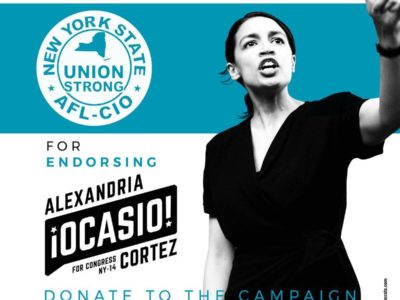If You’re Not At The Table, You’re On The Menu
Why Has Labor Attacked The Green New Deal?

One more entry in the “Not Helpful” Department:
The AFL-CIO, the national arm for U.S. labor unions, offered a critical assessment of the Green New Deal, warning that the ambitious plan to combat climate change could adversely affect U.S. workers.
In a letter last week to Sen. Edward J. Markey (D-Mass.) and Rep. Alexandria Ocasio-Cortez (D-N.Y.), the lawmakers who introduced a resolution last month detailing the key components of their plan, members of the AFL-CIO’s Energy Committee said it could not support a proposal that did not address their concerns.
“We will not stand by and allow threats to our members’ jobs and their families’ standard of living go unanswered,” wrote Cecil Roberts, president of the United Mine Workers of America, and Lonnie Stephenson, president of the International Brotherhood of Electrical Workers.
On substance, labor’s complaint makes no sense. To the extent that the Green New Deal has precise content, it represents a massive public works program of the kind that usually helps workers in general and organized labor in particular. Someone has to build all those high-speed rail lines, and install all those solar panels, and construct all those electric cars. And given that the Green New Deal will only be enacted by a Democratic Congress and White House, that labor figures to be unionized.
So what’s going on?
The most obvious answer lies in the identity of one of the authors: Cecil Roberts, President of the UMW. Mine workers, particularly coal mine workers, don’t figure to be winners in any transition to a renewable energy economy. This is a traditional issue in the history of American labor: do you believe in a broad working-class solidarity, or do you look out for your own particular interest? A particularly egregious instance of this came up in the stillborn Amazon development in New York City, where the Building Trades Council supported the deal because the construction would be done with unionized labor, and didn’t seem to mind that the projected Amazon warehouse would not be unionized. The relative degree of broad solidarity versus parochialism varies between unions: Walter Reuther’s United Auto Workers epitomized the former. The Building Trades are infamous for the latter: as a friend of mine remarked, “if you asked the Building Trades to construct Dachau, the only they would care about is if they got prevailing wage.” It was the Building Trades who sponsored the infamous Hard Hat Riot in the New York City in 1970.
But I actually don’t think that is primarily what is happening. Roberts is no fool: he understands that coal mining jobs are going away and are never coming back. As I noted awhile ago, there are more yoga instructors than coal miners in the United States.

Rather, this is a procedural complaint. The Green New Deal is the brainchild of Alexandria Ocasio-Cortez, and it appears to have been written by her and the Sunrise Movement of young climate activists. It has little specific substantive content. But that means that the unions weren’t in the room. And when you have members whose jobs and livelihoods are on the line, you want to be in that room. As a lobbyist once told me, “if you’re not at the table you’re on the menu.” Moreover, these unions are aligned with Democratic leadership, which probably does not take kindly to AOC trying to drive the policy train.
That said, there was no need to go public with this unless the unions were trying to send a very stern message: Do Not Make Plans Unless You Clear It With Us First. And even then, they have just given a huge boon to the Republicans, who predictably jumped all over this. That is cutting off your nose to spite your face.
Whenever there are negotiations between factions inside a party, the issue always arises as to how to develop and use leverage. No one wants the Republicans to win — or at least no one should, and AFL-CIO leaders know how horrible the GOP is for workers. But if you don’t make appropriate threats, then other factions will take you for granted. It’s somewhat like a game of Chicken, which unlike the more famous Prisoner’s Dilemma, has not been modeled well by social scientists. Put more simply, this is a warning shot across progressives’ bow to trim their sails (the metaphor is actually consistent!). Perhaps the unions’ hope is that this will be enough. But if they actually oppose the Green New Deal completely, then that is a much bigger problem down the road, and an example of a union leadership betraying its members.
Reader Comments
2 Replies to “If You’re Not At The Table, You’re On The Menu”
Comments are closed.






Great article–thanks!
This procedural problem is a common thread throughout the environmental movement. (This may be partly because many of them are young, and the young always believe that they invented whatever is an important issue at the time – see the 60’s.) Environmental activists also rarely reach out to engineers (who are actually heavily involved in these issues mainly via their technical societies) to help understand the details of the solutions (which frankly tend to be highly technical).
This is especially unfortunate regarding global warming because one reason for denial is the perception that the problem is either impossible to solve or so difficult as to cause unacceptable disruptions. Thus the “best” course is instead to deny the problem altogether, much like Wiley Coyote standing on the air after running over the edge of a cliff. If an array of solutions was presented in detail, then the problem becomes tractable and it is no longer necessary to deny it, instead there is concrete action available.
In terms details regarding unions, I will note that if any of the approaches to oceanic carbon sequestration are viable, the various shipyard unions would see tenfold increases in employment right away.